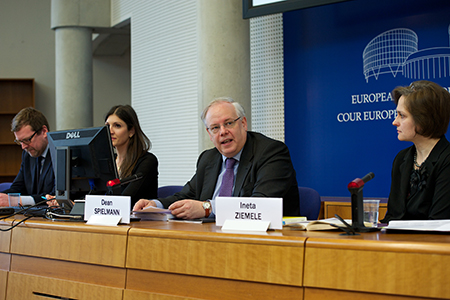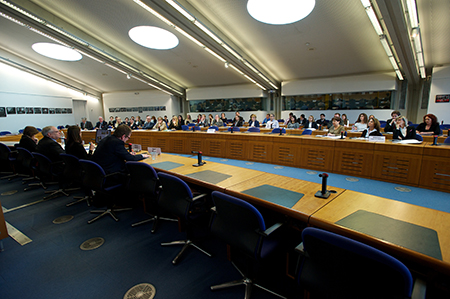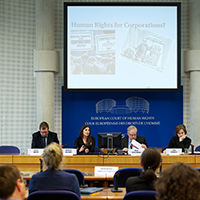 (From left) The University’s Dr David Whyte and Stefanie Khoury, with President of the European Court of Human Rights, Judge Dean Spielmann and Section President of the European Court of Human Rights, Ineta Ziemele
(From left) The University’s Dr David Whyte and Stefanie Khoury, with President of the European Court of Human Rights, Judge Dean Spielmann and Section President of the European Court of Human Rights, Ineta Ziemele
The prospect of establishing an alternative court of tribunal adjudicating corporate human rights violations was explored at a European Court of Human Rights seminar, organised by University of Liverpool academics.
The seminar, which was addressed by President of the European Court of Human Rights, Judge Dean Spielmann, was attended by more than 50 participants, ranging from senior court officials to lawyers of the court and representatives from the Council of Europe.
Safeguard against violations
Opening the debate, Judge Dean Spielmann said: “A series of recent cases in the court have strengthened the responsibilities of states to safeguard against violations by private parties, including corporations.” He referred to the “tremendous intellectual capital in the room” and encouraged participants to be “imaginative and provocative” in their contributions.
Currently, only states can be held responsible in a human rights court. Human rights law can be used to give corporations the same protections as physical persons, but cannot be used to hold them accountable. The research shows that a series of cases at the European Court of Human Rights have effectively expanded the ways that human rights can be granted to corporations. At the same time, in recent cases the Court has shown willingness to instruct states to prevent corporate human rights violations.
 The seminar was hosted at the European Court of Human Rights, in Strasbourg, and attracted more than 50 participants
The seminar was hosted at the European Court of Human Rights, in Strasbourg, and attracted more than 50 participants
Ineta Ziemele, Section President of the European Court of Human Rights told those assembled that the power and reach of many corporations outreached that of some states, and that corporations are now major authors of human rights violations. She paid tribute to the Liverpool research for developing those points and said: “This impressive research deals with an issue that clearly is the major human rights issue facing us in the 21st century. Why should corporations not be equated with states?”
Stefanie Khoury is a Research Consultant in the University’s Department of Sociology, Social Policy and Criminology, she said: “A major finding from the research is that judges at both the European Court of Human Rights, and the Inter-American Court of Human Rights advocated the use of a specialised forum or instrument for attributing corporate liability for human rights violations. We organised this seminar in order to develop those ideas further.”
Not fit for purpose
Report author and seminar organiser, Dr David Whyte is a Reader in Sociology at the University. Dr Whyte said: “We have to contemplate the possibility that human rights law is not fit for purpose – it cannot deal with the most serious violations committed by corporations. We therefore need to explore alternatives.”
The audience discussions were recorded and will be fed back to the Court in the form of a discussion document that will be used for developing future debate on new mechanisms for dealing with human rights violations. It is envisaged that the discussions at the seminar will also provide an opportunity for the research team to open up an ongoing dialogue with the Council of Europe and the UN Human Rights Council on this subject of growing international significance.
The research seminar is part of a long-term project, funded by the British Academy and the Arts and Humanities Research Council (AHRC).
